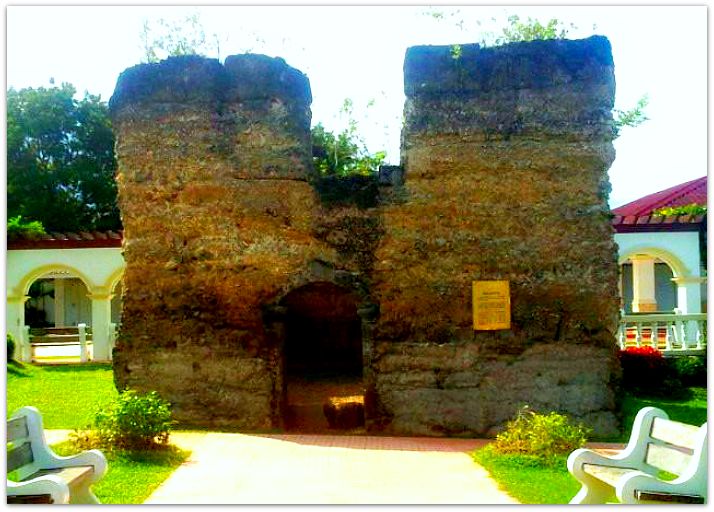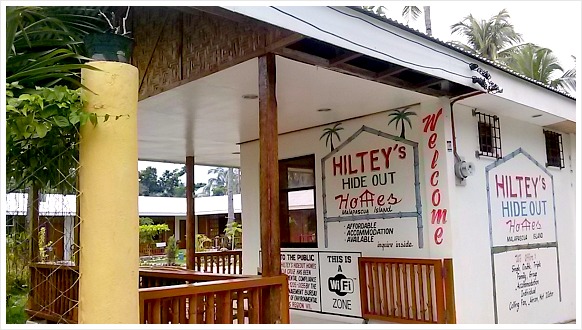Alegria Municipality, Cebu
 Alegria Heritage Park & Baluarte of Alegria Town, Cebu
Alegria Heritage Park & Baluarte of Alegria Town, Cebu'Enticing' Alegria Municipality
Alegria Municipality
is one of the 44 towns and considered a 4th class municipality of Cebu
Province in the Visayan Region, Republic of the Philippines.
The census in 2010 registered a total of 22,072 people who inhabit the sleepy and peaceful town. Alegria is bounded by Badian in the north and Dalaguete in the east.
History
When the Spaniards occupied the area in 1850, it was then popularly called ‘Tuburan’, a literal Bisayan translation for the word ‘spring’, which is quite abundant in various places of the municipality until now.
On January 31, 1850, Tuburan leaders requested the Cebu governor to support their petition for separation from Malabuyoc, its mother town.
On September 25, 1850, the order to change its name to Alegria was issued. The decision to change its name was to prevent it from confusing with other “Tuburan” in other places (a barrio’s name present in Balamban and Bogo).
On August 9, 1854, the parish priest of Malabuyoc recommended the creation of Alegria parish. This move has been decided and the parish of Alegria got established on July 3, 1856, almost two years later.
Alegria is also known for its strong connection to its cultural roots, with numerous festivals throughout the year celebrating local traditions and customs.
The traditional Capiz shell lanterns created by the locals are a beloved symbol of Alegria, and the town also has a unique collection of antique statues depicting saints and other figures from local folklore.
The municipality boasts plenty of tourist attractions, including beautiful beaches, stunning waterfalls, and lush jungles. Adventure seekers can take part in adventure activities such as trekking and caving while nature lovers can explore the local flora and fauna.
Foodies can indulge in the town's fine cuisine, which consists of fresh seafood and other regional dishes.
Alegria is also home to a vibrant nightlife with numerous bars and clubs, making it an ideal destination for those looking to experience the best of Philippine culture.
Overall, Alegria offers something for everyone, so come and explore this vibrant town and its culture! You won’t regret it.
 Alegria Heritage Park Baywalk (source: costa de letecia)
Alegria Heritage Park Baywalk (source: costa de letecia)Sources of Livelihood in Alegria
Agriculture
The soil of Alegria is rich and can grow various
species of crops that can support the daily needs and consumption of the
inhabitants. Most farmers grow coconut trees, corn, sweet potatoes and
other crops that are considered a staple food, which can be sold in their
local markets.
Fishing
The municipality is also blessed
with resources from the sea as the inhabitants’ source of calcium and
other minerals. Many can easily go out to fish for their daily needs,
while some fisherfolks go out to fish as their primary source of income by
selling their catch to the local market.
Bamboo Products
Aside
from farming and fishing, Alegrian people are good producers of
handmade products made of bamboo. They can weave baskets, hats, home
decors, among other products that can be sold locally and even
internationally.
In thanksgiving to this source of livelihood, Alegrian folks celebrate a yearly festivity that attracts non-locals to watch and enjoy the event.
 Baywalk in Alegria Town, Cebu Province (photo: Alegria fb)
Baywalk in Alegria Town, Cebu Province (photo: Alegria fb)Activities, Attractions & Nice Places
There are loads of places and attractions that are worth visiting and
spending your energy with. Alegria offers various natural wonders
including fresh water springs, caves, and waterfalls. Here are some of
them…
- Alegria Heritage Park
- Cambais Falls
- Cambusay Cave and Salay Cave
- Cancalanog Falls
- Canlaob Falls
- Kabukalan Spring
- Kantayong Cave
- Kawa-Kawa Falls
- Libo Hills
- Montpeller Falls
- The Baluarte of Alegria
Mount Lanaya
Mt. Lanaya is located South of
Alegria in Cebu. Basically, the mountain is being blanketed by secondary
forest aside from some patches of taller lowland forest, coconut trees,
bamboos, bush, shrubs and grasses.
Mount Lanaya has an altitude of 600
meters with its peak (Kalo-Kalo Peak) provides an amazing view of
Alegria Town as well as its neighboring towns – Malabuyoc and Badian.
You
can easily climb Lanaya either from its base (which is a bit
challenging but fun for an adventurous person) or get to chapel of
Lumpan (by taking a habal-habal – that’s a motorbike for hire) and start
from there.
If you prefer, you can hire a mountain guide (for around Php500 or 10US dollar) by asking the local barangay captain (local unit appointed head official).
Alegria Town, Cebu Resorts
In Algeria Municipality, there are various places to see and nice attractions or resorts where one can enjoy the refreshing breeze and tranquility of the place.
A lot of visitors come to see and enjoy Alegria's endowment and nature's gift or its historical heritage.
Batong Malunhaw Beach Resort
This
resort located in Madridejos, Alegria has been established and under
the surpervision of Alegria Municipality. The resort offers an
accommodation with airconditioned rooms, and has a Pavillion (for
weddings, events, etc.), swimming pool, snorkeling site, and picnic
areas for families or groups. If interested, you may contact them
(phone: +63 32 4768022).
Costa de Leticia Resort & Spa
Costa
Resort is an upscale establishment in Alegria Cebu that provides
upscale facilities and services. It generally offers great
accommodations, an infinity swimming pool, toddler’s pool, coffee & bar
restaurant, function rooms for events, and more. Costa de Leticia tries
to promote environmental protection by applying solar energy in their
facilities. Way to go!
 Costa de Leticia Beach Resort (photo: Alegria fb)
Costa de Leticia Beach Resort (photo: Alegria fb)Administrative Subdivision
Alegria is composed of 9 smaller government units called ‘barangay’(s). Most of the names have obviously not been changed since the Spanish occupation in the province. These names are interestingly named after popular saints and places in Spain signifying the roots of Catholicism in the area…
Compostela, Guadalupe, Legaspi, Lepanto, Madridejos, Montpeller, Poblacion, Santa Filomena, Valencia
Festival
The festivity that has been mentioned aforehand is called the “Kawayan Festival” which is annually celebrated on December 2. Townfolks usually celebrate it with street dances and presentations (or mardi gras) by showing their locally made bamboo products or displaying them everywhere for visitors to see.
Kawayan Festival is celebrated as part of the town's fiesta in honor of Saint Francis Xavier, a famous patron saint not only in Alegria Town but also all around the churches in the country.
You can find more promotions from the Municipality of Alegria's facebook here.
Getting to Alegria Municipality
The easiest way to get to Alegria is by public transport - bus or van.
The safest is by bus. Head to Cebu South Bus Terminal in Cebu City. Look for the one traveling to Bato/Barili direction. Get off at Alegria township.
For most buses, including Ceres bus, the fare is around 140 Pesos. If you are a student, a child, a senior citizen, and other privileges, you will get discounts.
Discounts are given should you present any identification card or credentials.
Thanks so much for visiting this page. Enjoy your trip!
- Home
- Cebu Municipalities
- Alegria Municipality
Book Your Activity Here...
Please Like, Share...
Leave Messages...
|
|
Book & confirm your hotel room quickly and safely with Agoda Company. Agoda uses a state-of-the-art technology when processing your transaction online. Traveling Cebu is Agoda's official partner for eight years now. Find now your hotel here or below.






